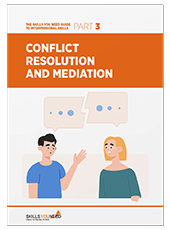Offering Constructive Criticism
See also: Giving and Receiving FeedbackCriticism is defined by Chambers English Dictionary as ‘passing judgement’ on another person.
Its original sense, therefore, may well have been both positive and negative, in the same sense that a theatre critic can give a very positive review.
There is no question, however, that most of us would view personal criticism as negative.
'Criticism' might, in fact, be considered another word for ‘negative feedback’.
This page explains how to make your critical analysis of others ‘constructive’, so that you set the stage for improvements, rather than ‘destructive’ which could ‘knock down’ the other person.
Destructive and Constructive Criticism
Our page on Dealing with Criticism explains that the difference between constructive and destructive criticism is the way in which the comments are given.
Destructive criticism offers no help or support for improvement, simply sets out the problem as seen by the person giving criticism. It is usually expressed as a comment about the recipient, their skills or attributes and not their behaviour. You can think of it as tending to bring someone down, and making them feel bad, whether this is deliberate or not.
Constructive criticism, on the other hand, identifies ways in which the recipient can make changes that improve matters. It builds up the other person, and helps them to make positive changes to their behaviour in order to avoid future problems.
The best way to offer constructive criticism is to think of it as ‘negative feedback’, and always follow the rules about giving feedback.
There is more about this in our page on Giving and Receiving Feedback.
Rules for Giving Feedback
1. Constructive Criticism Focuses on Behaviour
Good feedback, whether positive or negative, focuses on behaviour.
It should not be about what the other person is, or what they believe, but what they did. Constructive criticism takes this one step further, and focuses on the behaviour that you want, not the behaviour that you saw and did not appreciate.
Top Tip for Constructive Feedback
Instead of saying something like:
‘Please don’t do that, I really hate it,’
Try saying:
‘I would really like it if you would do this, instead of that, as it would have x effect.’
Feedback or criticism couched in these terms is much easier to accept and act upon because it says clearly what behaviour would be better, and offers a solution or option for change.
2. Good Feedback Focuses on the Effect on You, Not on the Other Person’s Intentions
This is not selfishness, but a simple understanding that you do not know what the other person intended or thought, only the effect that it had on you.
It is therefore most helpful if you can give your feedback in terms of the effect that it had on you. For example, you might say ‘When you do that, I feel like this’.
Constructive criticism takes this further, however, and focuses on the behaviour that is necessary to induce better feelings.
Top Tip for Constructive Feedback
Don’t say:
‘When you do that, it makes me feel like this,’
Instead, try saying:
‘If you were to do x, I think it would make me feel y.’
3. Effective Feedback Needs to be Very Specific
Good feedback is as specific as possible. The more detailed you can be about the behaviour that you want to see, the easier it is for the other person to do it.
You don’t even need to say what behaviour you don’t like: instead, you can try asking if the other person would be prepared to do something different.
Top Tip for Constructive Feedback
Try asking the other person to do what you would like as a simple favour. It doesn’t have to be a comment on their previous behaviour at all.
Use phrases like: “Would you mind doing x?” “Please will you do y? It would be so helpful.”
These may not offer long-term solutions but it will show, quickly and effectively, what you would like them to do.
You can also hope that they will take it on board as a lasting change.
4. Feedback Needs to be Given Promptly
It’s no good dragging up old events long afterwards.
To be effective, feedback and criticism need to be more or less immediate, while the events are still fresh in everyone’s minds.
That said, if you’re angry about what’s happened, it’s probably best to wait until you are calmer as this will enable you to keep the conversation constructive.
Top tip for constructive criticism
Don’t get mad, get even!
No, you’re not looking to get your revenge, but to calm down and get your relationship back on an even footing.
Don’t be tempted to criticise when you’re angry. It won’t be pretty, and it certainly won’t be constructive.
5. Feedback has to be Heard to be Effective
This follows from the last rule: you need to give feedback, particularly negative feedback, at a time when the other person is ready to hear it.
It’s no good doing it when either of you is angry, or when you’re tired, or not ready to hear potentially unpleasant news.
Pick your moment and ensure that you make it clear that you have something important to say.
For more about getting your timing right, have a look at our page on Emotional Awareness to help you to pick up on body language and other clues about receptiveness.
Walk a Mile in the Other Person’s Shoes
Above all, before you give any kind of criticism or negative feedback, think about how you would like to hear the same piece of information.
Would what you want to say be acceptable to you?
Ask yourself honestly, and really think about the answer.
Only if you are really sure that you would find it acceptable should you give that piece of criticism in that way. Otherwise, it’s probably best to go back to the rules on this page, and find another way.

